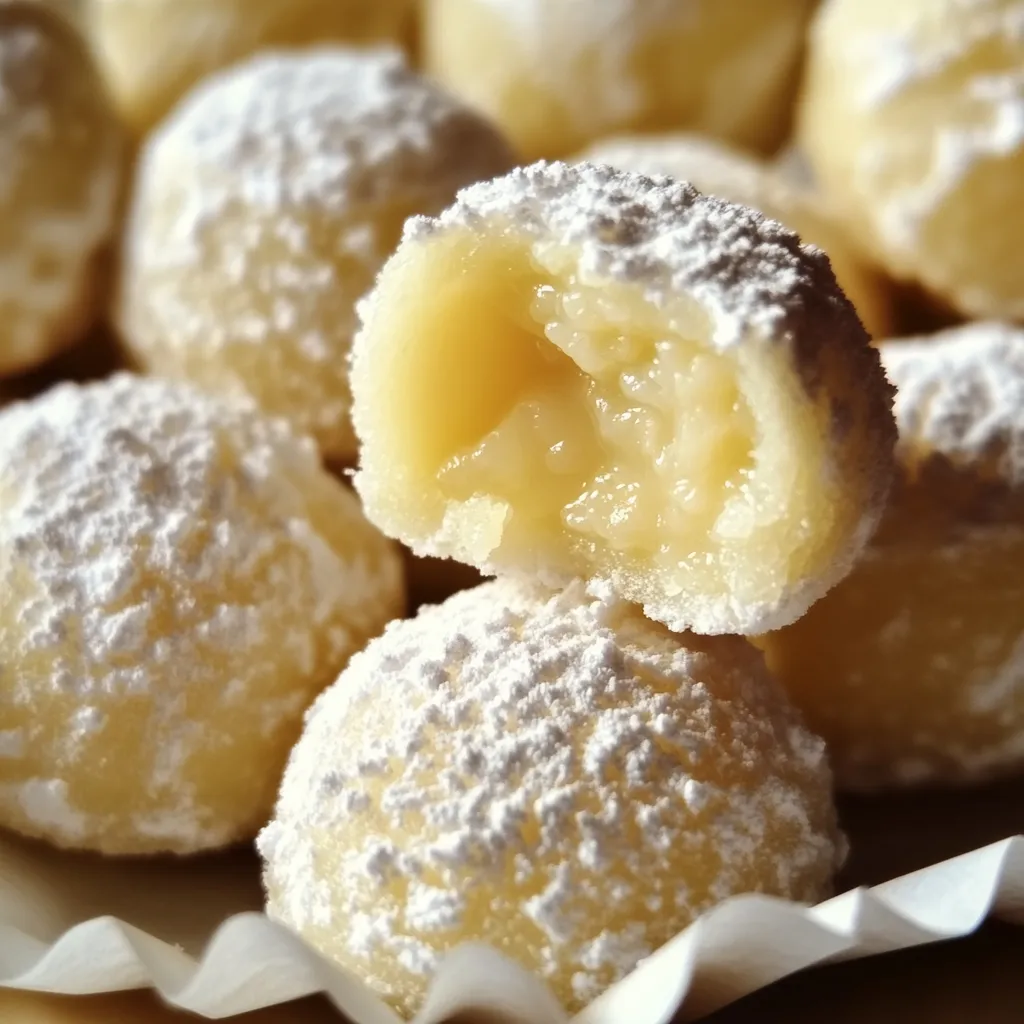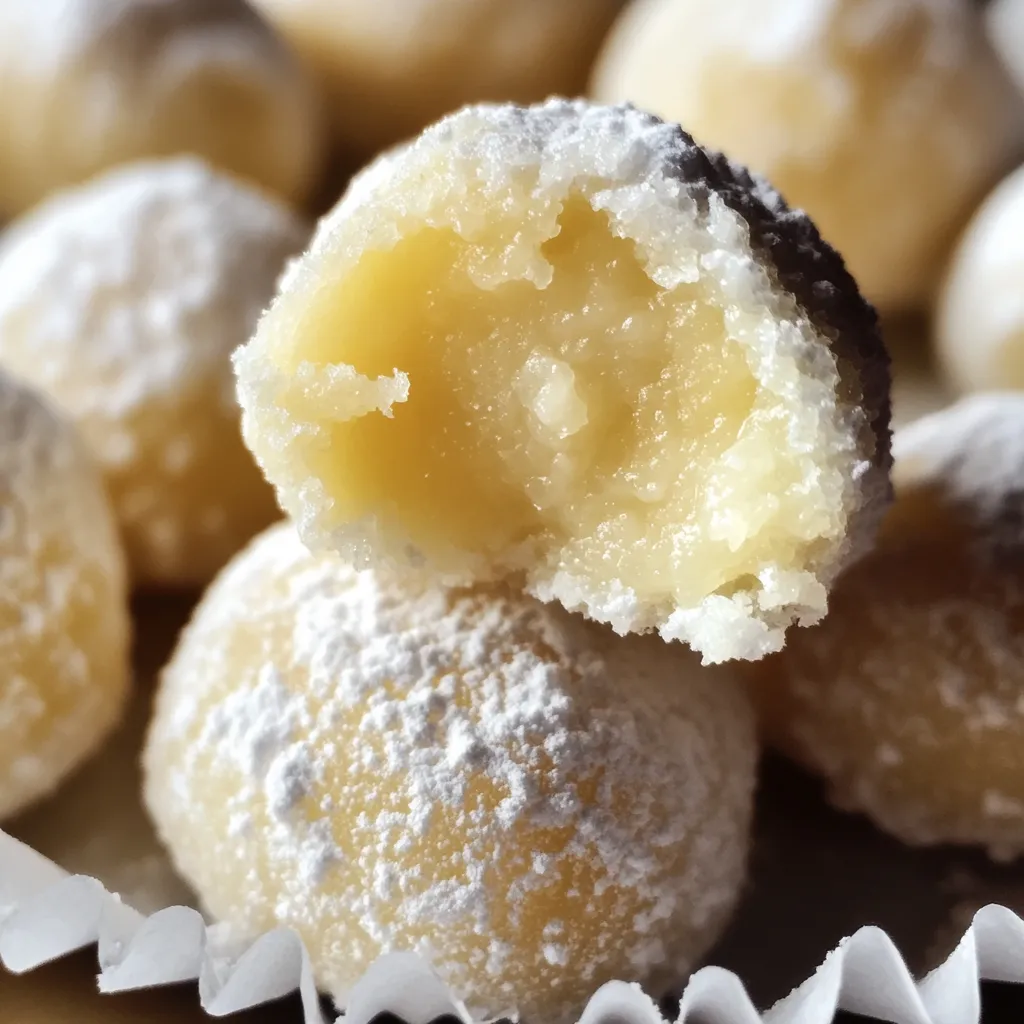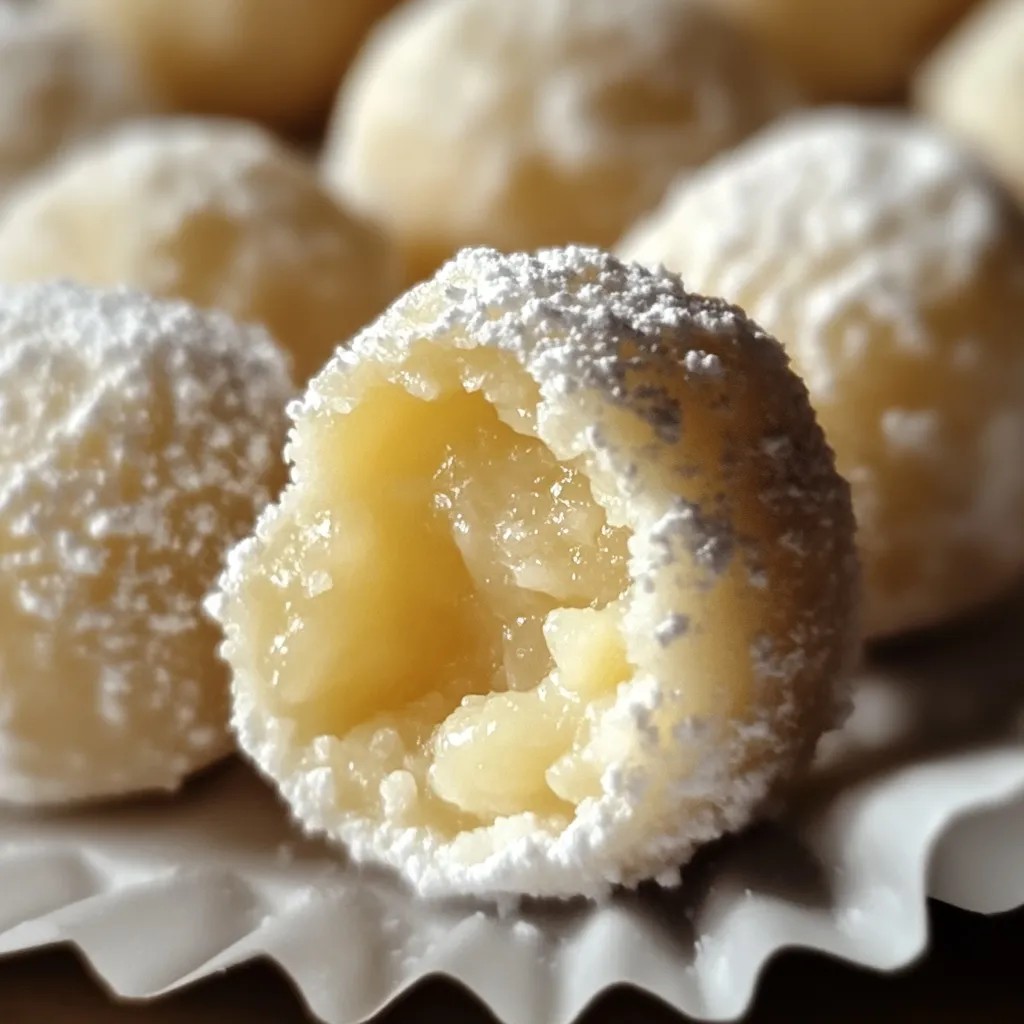 Save
Save
Silky white chocolate ganache infused with bright citrus creates bite-sized confections that deliver the perfect balance of tangy lemon and creamy sweetness in each luxurious morsel. These no-bake truffles capture sunshine in edible form, offering a refreshing alternative to traditional chocolate varieties while maintaining that irresistible melt-in-your-mouth texture. Their beautiful pale yellow interior contrasts elegantly with snowy white coating, making them as visually appealing as they are delicious.
Last spring, I made these for my mother's birthday gathering, placing them on tiered stands throughout the garden party. Their delicate lemon flavor paired perfectly with afternoon tea, and several guests requested the recipe before leaving. Something about the combination of creamy white chocolate with vibrant lemon seems to create an irresistible treat that appeals to even those who typically decline dessert.
Essential Ingredients
- White Chocolate: Forms the luxurious base of these truffles. Select high-quality bars with cocoa butter listed among the first ingredients—chips often contain stabilizers that affect melting quality.
- Heavy Cream: Creates the smooth ganache texture. Its high fat content ensures proper emulsion with the chocolate while contributing to the silky mouthfeel.
- Unsalted Butter: Adds richness and helps create ideal texture. Room temperature butter incorporates more smoothly into the ganache mixture.
- Lemon Zest: Provides concentrated citrus oils essential for authentic flavor. Use only the bright yellow outer layer, avoiding bitter white pith beneath.
- Fresh Lemon Juice: Delivers bright tanginess that cuts through the sweetness. Fresh-squeezed juice offers significantly more vibrant flavor than bottled alternatives.
- Coating Options: Powdered sugar, coconut, or crushed cookies create the finished exterior. These not only add visual appeal but also prevent stickiness when handling.
Truffle Creation
- Chocolate Preparation
- Finely chop high-quality white chocolate into small, uniform pieces to ensure even melting. Place in a heat-resistant glass bowl along with room temperature butter. The small chocolate pieces create more surface area, allowing for faster, more even melting when hot cream is added.
- Cream Infusion
- Heat heavy cream in a small saucepan over medium heat just until small bubbles form around the edges—do not allow to boil vigorously. This precise temperature ensures the cream is hot enough to melt the chocolate without scorching or separating.
- Ganache Formation
- Pour hot cream over the chopped chocolate and butter, ensuring all chocolate pieces are submerged. Allow to sit undisturbed for two minutes, giving the heat time to penetrate and begin melting the chocolate before disturbing the mixture.
- Gentle Emulsion
- Stir the mixture slowly from the center outward using a silicone spatula or whisk, creating a smooth emulsion as the chocolate melts. If any unmelted pieces remain, place the bowl over a pan of barely simmering water, stirring constantly until completely smooth.
- Flavor Incorporation
- Add fresh lemon zest and juice to the warm ganache, stirring gently but thoroughly to distribute the citrus flavor evenly throughout. The warmth helps release essential oils from the zest, intensifying the lemon presence in the finished truffles.
- Cooling Period
- Cover the bowl with plastic wrap, pressing directly onto the surface of the ganache to prevent a skin from forming. Refrigerate for 2-3 hours or until firm enough to hold its shape when scooped, but still pliable enough to roll.
- Truffle Formation
- Using a small cookie scoop or melon baller, portion the chilled ganache into uniform amounts. Working quickly, roll each portion between clean palms to form smooth spheres. If the mixture becomes too soft during handling, return to refrigerator for 15 minutes before continuing.
- Finishing Touch
- Roll each formed truffle in your chosen coating—powdered sugar creates a classic snowball appearance, while shredded coconut or crushed cookies offer textural contrast. Place coated truffles on a parchment-lined tray and refrigerate briefly to set before serving or storing.
 Save
Save
My first attempt at these truffles was nearly derailed when I added cold lemon juice to the warm ganache, causing it to seize slightly. A pastry chef friend later taught me to have all ingredients at room temperature before combining, and to add acidic components slowly while stirring constantly. These simple adjustments made an enormous difference in achieving that perfectly smooth, silky texture that makes these truffles so special.
Serving Inspirations
These versatile truffles create beautiful harmony with complementary beverages that enhance their bright flavor. Serve alongside afternoon tea or coffee for a sophisticated pairing that balances the sweetness. For elegant entertaining, present on a silver platter with fresh berries and mint leaves to create a visually stunning dessert display with minimal effort.
Creative Variations
This adaptable recipe welcomes numerous interpretations while maintaining its essential character. For complex flavor depth, add a teaspoon of pure vanilla extract or a tablespoon of limoncello liqueur to the ganache. Berry enthusiasts might incorporate dried blueberries or raspberries into the coating for fruity contrast. For textural interest, fold finely chopped pistachios or toasted coconut into the ganache before chilling.
Keeping Them Fresh
Store finished truffles in an airtight container with parchment paper between layers to prevent sticking. They maintain peak quality in the refrigerator for up to one week, though their intense flavor actually improves after 24 hours as the lemon notes fully permeate the ganache. For longer storage, arrange in a single layer and freeze for up to two months, thawing overnight in the refrigerator before serving.
 Save
Save
After making these lemon truffles for countless special occasions, I've found they represent the perfect balance between impressive presentation and practical preparation. The bright citrus flavor paired with creamy white chocolate creates a confection that feels sophisticated yet approachable. Whether prepared as homemade gifts, served at celebrations, or simply enjoyed as a special treat, these truffles consistently deliver a moment of joy with every bite.
Common Questions About Cooking
- → Can I make these lemon truffles ahead of time?
- Absolutely! These truffles are perfect for making ahead. They'll keep in an airtight container in the refrigerator for up to 1 week, or you can freeze them for up to 3 months. If frozen, just thaw them in the refrigerator overnight before serving. The flavor actually develops nicely after a day or two in the fridge.
- → Why is my truffle mixture too soft to roll?
- If your mixture is too soft, it simply needs more chilling time. Place it back in the refrigerator for another 30-60 minutes. If it's still too soft after chilling, you can add a little more powdered sugar, about 2 tablespoons at a time, until you reach a rollable consistency. Also, make sure your butter wasn't too warm when mixing.
- → Can I use bottled lemon juice instead of fresh?
- While fresh lemon juice provides the best flavor, you can substitute bottled lemon juice in a pinch. However, don't skip the lemon zest - it contains essential oils that give these truffles their bright, authentic lemon flavor. If using bottled juice, you might want to add a bit more zest to compensate.
- → How do I get a smooth white chocolate coating?
- For a smooth white chocolate coating, make sure your truffles are very cold before dipping (place them in the freezer for 15 minutes). Melt the white chocolate slowly - either in 30-second intervals in the microwave, stirring between each, or using a double boiler. Add 1 teaspoon of coconut oil or shortening to the melted chocolate to thin it slightly for easier dipping.
- → Can I make different flavors using this recipe?
- Yes! This recipe works as a great base for many flavor variations. Try lime juice and zest for lime truffles, or orange for orange truffles. You could also add different extracts like vanilla, almond, or coconut (use 1/2 teaspoon). For chocolate truffles, replace 1/2 cup of powdered sugar with cocoa powder. The possibilities are endless!
